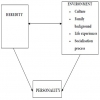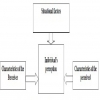Home | ARTS | Management Concepts & Organisational Behaviour
|
Learning Theories - Perception And Learning
Management Concepts & Organisational Behaviour - Perception And Learning
Learning Theories - Perception And Learning
Posted On :
In an organization, employees have to learn and practice productive work behaviours.
Learning Theories
In an organization, employees have to learn and practice productive work behaviours. The manager’s task is to provide sufficient learning experiences to employees in an environment that will facilitate learning process and promote desired behaviours. Training prepares employees to meet the challenges of the job, for which incentives are to be provided to learn and practice right behaviours. The following are the important theories of learning.
Classical conditioning is the process by which individuals learn to link the information from a neutral stimulus to a stimulus that causes a response. This response may not be under an individual’s conscious control. Pavlov, in his experiments, hanged some meat in front of dogs. This meat is unconditioned stimulus or unlearned stimulus. The dogs responded to this stimulus by salivating. This kind of response was instinctive or unconditioned. Afterwards Pavlov started to ring a bell at the same time when meat was offered. Ringing the bell without offer of meat was not connected to any responses. However, by ringing the bell every time when meat was offered, Pavlov established a relationship between the two stimuli that is the bell and the meat. With the continuation of the process, the ringing of the bell alone acted like a stimulus to evoke the response of salivating even without presentation of meat. As a result, the bell became a conditioned stimulus leading to conditioned response.
B.F. Skinner coined the term operant conditioning to refer to a process by which individuals learn voluntary behaviour. Voluntary behaviours are called operant because they operate or have some influence on the environment. Learning occurs from the consequences of behaviour, and many employee work behaviours are operant behaviours. As a matter of fact, most behaviours in everyday life are forms of operant behaviour. Managers are interested in operant behaviours because they can influence the results of such behaviours. On the basis of the direct relationship between the consequences and behaviour, the management can identify the relationship and try to modify the behaviour. That is how the behaviour can be controlled by manipulating its consequences. Two principles guide this relationship.
-- The behaviour that results in positive rewards is likely to be repeated and behaviour with negative consequences is likely to be extinguished.
-- Based on such consequences, the behaviour can be predicted and controlled.
Therefore, some consequences can be used to increase the recurrence of desired behaviour and some other consequences can be used to decrease the recurrence of undesired behaviour.
In an organization, employees have to learn and practice productive work behaviours. The manager’s task is to provide sufficient learning experiences to employees in an environment that will facilitate learning process and promote desired behaviours. Training prepares employees to meet the challenges of the job, for which incentives are to be provided to learn and practice right behaviours. The following are the important theories of learning.
Classical Conditioning
Classical conditioning is the process by which individuals learn to link the information from a neutral stimulus to a stimulus that causes a response. This response may not be under an individual’s conscious control. Pavlov, in his experiments, hanged some meat in front of dogs. This meat is unconditioned stimulus or unlearned stimulus. The dogs responded to this stimulus by salivating. This kind of response was instinctive or unconditioned. Afterwards Pavlov started to ring a bell at the same time when meat was offered. Ringing the bell without offer of meat was not connected to any responses. However, by ringing the bell every time when meat was offered, Pavlov established a relationship between the two stimuli that is the bell and the meat. With the continuation of the process, the ringing of the bell alone acted like a stimulus to evoke the response of salivating even without presentation of meat. As a result, the bell became a conditioned stimulus leading to conditioned response.
Operant Conditioning
B.F. Skinner coined the term operant conditioning to refer to a process by which individuals learn voluntary behaviour. Voluntary behaviours are called operant because they operate or have some influence on the environment. Learning occurs from the consequences of behaviour, and many employee work behaviours are operant behaviours. As a matter of fact, most behaviours in everyday life are forms of operant behaviour. Managers are interested in operant behaviours because they can influence the results of such behaviours. On the basis of the direct relationship between the consequences and behaviour, the management can identify the relationship and try to modify the behaviour. That is how the behaviour can be controlled by manipulating its consequences. Two principles guide this relationship.
-- The behaviour that results in positive rewards is likely to be repeated and behaviour with negative consequences is likely to be extinguished.
-- Based on such consequences, the behaviour can be predicted and controlled.
Therefore, some consequences can be used to increase the recurrence of desired behaviour and some other consequences can be used to decrease the recurrence of undesired behaviour.
Tags : Management Concepts & Organisational Behaviour - Perception And Learning
Last 30 days 666 views















